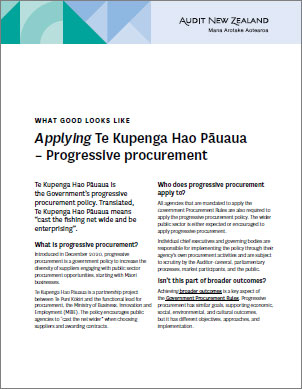What good looks like: Applying Te Kupenga Hao Pāuaua – Progressive procurement
This is part of our series on What good looks like, produced by our Specialist Audit and Assurance Services team.
![]() Download PDF of Applying Te Kupenga Hao Pāuaua – Progressive procurement, 71KB, 2 pages
Download PDF of Applying Te Kupenga Hao Pāuaua – Progressive procurement, 71KB, 2 pages
Te Kupenga Hao Pāuaua is the Government’s progressive procurement policy. Translated, Te Kupenga Hao Pāuaua means “cast the fishing net wide and be enterprising”.
 What is progressive procurement?
What is progressive procurement?
Introduced in December 2020, progressive procurement is a government policy to increase the diversity of suppliers engaging with public sector procurement opportunities, starting with Māori businesses.
Te Kupenga Hao Pāuaua is a partnership project between Te Puni Kōkiri and the functional lead for procurement, the Ministry of Business, Innovation and Employment (MBIE). The policy encourages public agencies to “cast the net wider” when choosing suppliers and awarding contracts.
Who does progressive procurement apply to?
All agencies that are mandated to apply the Government Procurement Rules are also required to apply the progressive procurement policy. The wider public sector is either expected or encouraged to apply progressive procurement.
Individual chief executives and governing bodies are responsible for implementing the policy through their agency’s own procurement activities and are subject to scrutiny by the Auditor-General, parliamentary processes, market participants, and the public.
Isn’t this part of broader outcomes?
Achieving broader outcomes is a key aspect of the Government Procurement Rules. Progressive procurement has similar goals, supporting economic, social, environmental, and cultural outcomes, but it has different objectives, approaches, and implementation.
Key policy objectives
- A Māori business is a Māori authority (as classified by the Inland Revenue Department) or has a minimum of 50% Māori ownership.
- Sustainable, long-term behavioural change in public sector procurement practices to identify and remove barriers to competition.
Note: In September 2024, the requirement of awarding a certain percentage of contracts to Māori businesses was removed.
We expect mandated agencies to have:
- an up-to-date procurement policy that is consistent with these policy objectives;
- a clear understanding of how they are implementing progressive procurement – with updated tools, approaches, templates, and guidance;
- complete and up-to-date information on their current suppliers, in order to identify the Māori businesses among them;
- a good understanding of possible barriers that prevent Māori businesses from engaging with procurement processes, and plans to remove these barriers;
- enough knowledge of all suppliers to demonstrate that they are “casting the net wide”; and
- procurement approaches that identify, reach out to, and make it easy for Māori businesses to compete for contracts.
Agencies should ask themselves…
- Have we reviewed our procurement policies, procedures, tools, and templates to address progressive procurement?
- Are we applying our procurement policies consistently and well?
- Do senior managers and governors have the information they need to monitor and review how the agency has given effect to the progressive procurement policy?
- Do we have a framework to monitor progress and further review our approach if needed?
- Do we share what we have learned with our staff and other agencies?
Where to find out more
Audit New Zealand’s website includes a focus on procurement in our What goods looks like series.
Further details can be found at the website for Progressive Procurement, including information for agencies and the MBIE reporting requirements
Page last updated: 21 February 2025
